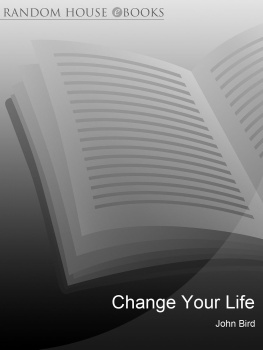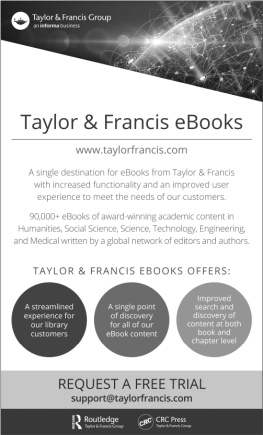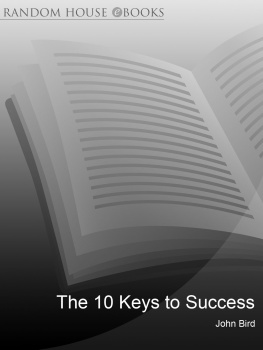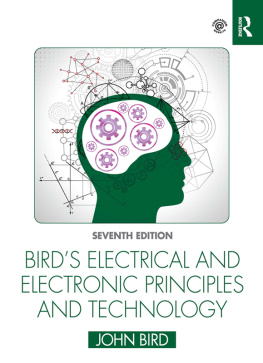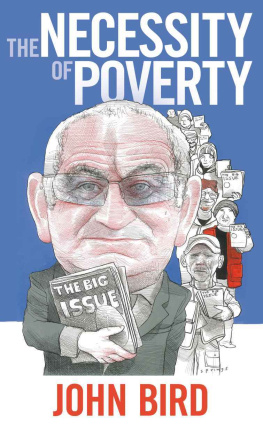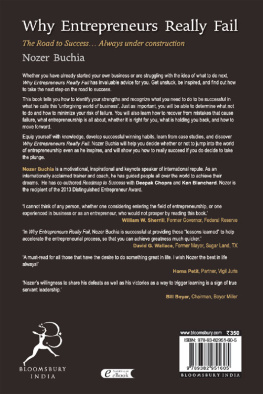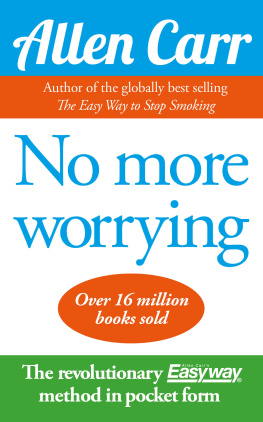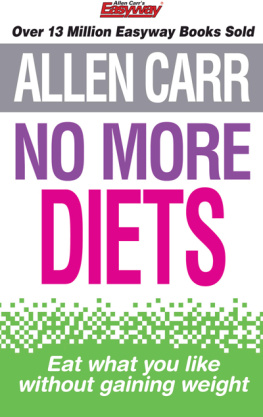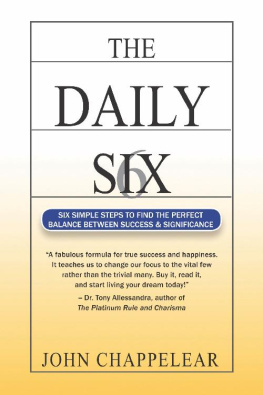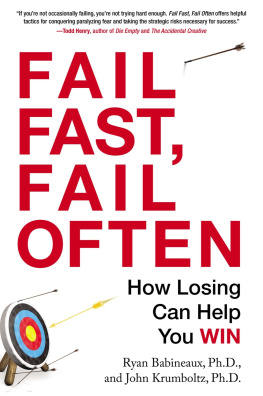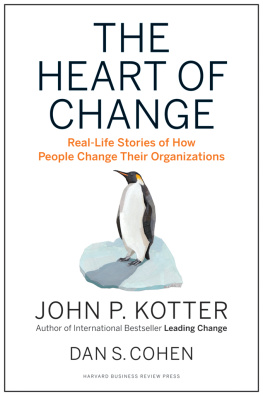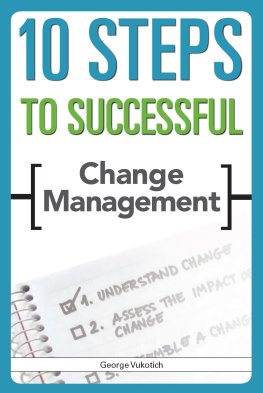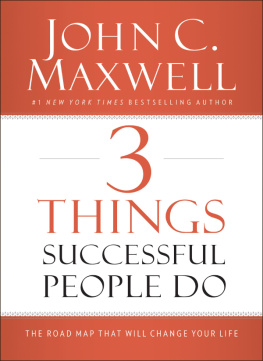CONTENTS
INTRODUCTION
I WAS 15 when I first realised I could change my life. I was banged up in a young offenders institution on the edge of London where I was locked in a cell for 23 hours of every day. Id been dumped by my family and felt hated by all who knew me. I had no love, no hope, no comforts, only the prospect of being in prison for a few more years. I had never felt so low.
You might ask: how does a teenage boy end up in a prison cell? Well, it was like this. Born in a slummy part of Notting Hill in London, I was made homeless at a young age, along with four of my brothers. When I was seven we were put into a Catholic orphanage where we stayed for three years before the family was reunited in Fulham. But the problems did not end there. I became a very troubled boy an arsonist, a truant, a shoplifter, a housebreaker. And all of this stemmed from those first 10 years when I thought I must be the worst kind of person for so many bad things to happen to me.
One day a prison officer came into my cell. Any requests, boy? he said.
No, sir, I replied.
What about a book? he asked.
I gave him a look.
Probably cant read a book, eh, boy?
I didnt say anything.
He left, but returned later with a book. He threw it across the cell along with a pencil. Put a line under all the words you dont understand, he said.
I can read some, sir, I replied defensively.
He said, Well, youve got some time on your hands to get better.
Over the next few weeks the prison officer would look at the words I had underlined, one chapter at a time. He would then explain the words, and get me to write them down. He wasnt a teacher by profession, but a very kind human being, although he hid his kindness behind a gruff exterior. After a few weeks he said, Youre not as daft as you look, are you?
That prison officer was probably the most important person I ever met. He didnt patronise me or pretend things were better than they were. He just gave me support at a time when it looked as though I was heading for a life of crime and madness. I still struggle with reading. I still get blanks. My spelling is better, although it will never be effortless. But nobody can stop me from reading and writing, and continuously educating and informing myself.
Though I continued to make a pigs ear of my life, the seeds had been sown in that prison cell. I wasnt on the road to automatic failure. I could learn and I could change my life. And so can you.
A big part of my job today is giving talks and presentations about my life to inspire people anyone from prisoners to property developers, via probation officers and government workers. Inspiring is a strange game. What you have to do is tell people what got you going, what helped you to change, what made you the person you are today. People normally expect you to have had one hell of a struggle, and they want a description of how you surmounted the most difficult of obstacles. So I seem to fit the bill, having come from a background of poverty, crime and homelessness before I became a helper to those in need.
But when I am sent the publicity material before my presentations I am always surprised at the words they use to describe my life, as if I have single-handedly wrestled a monster to the ground, or am a giant of hard work, hard living and hard character. It doesnt reflect the person I really am: someone who knows how to fight, but quite often loses; someone who got involved in creating The Big Issue, but was also accused of being incompetent and lacking in leadership, and of nearly destroying it.
I know its kind of necessary to be built up as this great person who takes no prisoners and doesnt suffer fools gladly, so that people will want to come and listen to me. If I were presented as the very contradictory person that I am, then I might not be asked to give these talks. But the problem for me is that I do take prisoners and suffer fools, and sometimes I dont feel at all dynamic or worthwhile. And I want you to know this because otherwise the implication is that success and change for the good can only be achieved by great people who spend all their time being great. This is not true. The world is not full of icons, and you dont have to be a superhero to do something worthwhile.
So what I want to do in this book is tell the truth about my meandering road to success, with all the pitfalls and pit stops, in the hope that it will inspire you to feel that you too can change your life and make a contribution to the world. I want to share the experiences of my life, not so that you can say, Poor chap, or Thats nothing, I had it twice as hard there are enough celebrity sob stories around. No, it is the lessons I have learned from my problems that are important. You can look at my life and realise, like me, that you should not be held back by your mistakes or limitations, but should instead turn them on their head and use them as the first steps on the road to success. More than anything, I want you to read this book and feel the blood rush to your head as you think: I can do it!
One of the questions I am often asked is: when did I convert from being a pain in the rear to a useful person? And the answer is, gradually. By default, by mistake, by humiliation, by getting it wrong more times than right, by climbing out of the sticky stuff one step at a time, never straight and clean. And then, because I was not great, I soon realised that the greatness was in the work I was doing, as I moved from being part of the problem to becoming part of the solution. Very few things happen overnight, and, in my experience, nothing happens without effort and commitment, which is why this is not the kind of book that says you can be whatever you want. Or that you can solve all the problems in your life without even thinking about them. But it will, I hope, make you believe that change is possible and within your grasp; that we all have it within us to make things happen.
I remember giving a lecture at a college in the Midlands and afterwards being stopped by a woman who worked in the canteen. She said to me, Youve made me think I shouldnt give up on my brother. Hes got terrible problems with drugs. Hes always doing something wrong against himself and us. But maybe there is something I can do for him. Ill try to get him some help.
She walked on with a smile, then looked back and waved. I knew that whatever I had said she had been able to apply to her own problems. She had grasped the fact that I wasnt giving the lecture merely as some personality; I was there to be useful. Which is what I want this book to be: useful and relevant to you.
I often wish I had had a map for my life, to show me the way and point me in the right direction. When I moved to the city of Lille in northern France to write my autobiography I didnt take a map with me. I didnt know the beginning, middle or end of the city, so I got lost constantly. I would follow the road I thought was mine and end up in a dead end. Sometimes I would walk right past my house without realising it. For a few weeks Lille was unknown territory and hard to understand, until eventually I found my way around and got the hang of the place. It felt just like my life; I lost my way, then found it again. A good life map, if I had followed it, could have saved me many problems, heartaches and wasted opportunities. I hope this book will be a good map for you, and make changing your life a lot easier.
INDEX
The page references in this index correspond to the printed edition from which this ebook was created. To find a specific word or phrase from the index, please use the search feature of your ebook reader.
acceptance 12023
achievement, knocking 1345
advice 48, 79
apprenticeship 448, 51, 52 art 7072, 869
Next page
